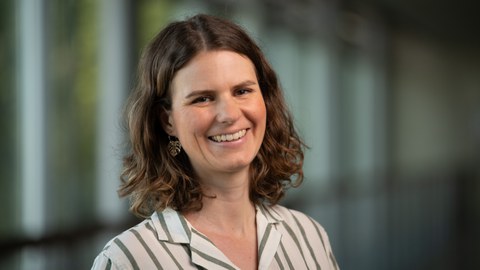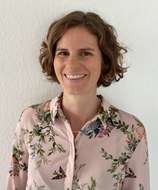Nov 05, 2025
Profile of new appointees - Prof. Dr. Natalie Orlowski

Prof. Dr. Natalie Orlowski
Prof. Dr. Natalie Orlowski has held the Chair of Forest Sites and Water Balance at the Faculty of Environmental Sciences since the summer semester 2024. In order to quench curiosity about her new colleague, she answers a few brief questions. In the following, Prof. Orlowski provides insights into her work in research and teaching.
What are your core research areas?
I work on water and material cycles, mainly in forest ecosystems. My core research areas are the influence of climate change. In particular, I investigate how extreme weather events such as droughts or extreme precipitation affect water uptake by vegetation and water transfer to the soil. For my research, I mainly use stable isotope techniques as an innovative measurement method to visualize and measure water fluxes directly in the soil, in plants and in the atmosphere. We can then derive insights into ecosystem processes based on real-time data. This allows us to estimate the impact of climate change on the water and material cycles of ecosystems.
What is your vision for the Chair?
I would like to further develop the innovative isotope measurement methods. These contribute to sustainable forest management and sustainable forest management. The basis for this is a better understanding of the processes of water flows and material flows in the forest ecosystem. Agricultural ecosystems also benefit from this. I involve the students in my research projects so that they have their finger on the pulse of the times. Of course, I also integrate the methods and results into my teaching and we offer field and laboratory exercises so that students can experience measurement methods at first hand.
I would also like to take this opportunity to mention that, as a female manager, I see myself as responsible for equal opportunities and equality and would like to stand up for this. I would like to encourage female and LGBTQ+ people to pursue a career in science and would like to facilitate this in a supportive and exemplary manner. Career paths, especially in our research areas, must be made equally accessible to everyone, and I would like to make a special effort to achieve this.
Where did you last teach/research/live?
My last position was in Freiburg in the hydrology department, where I held an academic council position for almost six years. I studied and did my doctorate in Giessen and was a postdoc in Canada at the University of Saskatchewan. I then took up a position as a teaching fellow at Justut Liebig University Giessen. I then found my way via Freiburg to Dresden, where I was acting Chair in 2023.
What was your doctoral thesis topic?
The title of my doctoral thesis was "Combining isotopic and hydrodynamic methods for understanding runoff - generation processes in a developed landscape". I specialized in stable isotope techniques and developed them further at the Chair and worked on water extraction methods for soil and plant samples. I then applied these in an agro-ecosystem in Hüttenberg (Hesse).
What was your best experience during your studies?
I really enjoyed my studies in Giessen. The agro-ecosystem in Hüttenberg, on which I then also wrote my doctoral thesis, established itself as a research landscape at the time, through which three Chairs were able to work together. Helping to lay the foundations for such a large project and actively shaping it was a special experience for me. My task was to install the measuring equipment, which led me to write both my Bachelor's and Master's thesis and ultimately even my doctorate in connection with the agro-ecosystem. The foundation for this was laid during my studies and I really enjoyed it.
When did you know: "I want to become a professor!"?
I was inspired by two people. Firstly, Prof. Breuer from Giessen, who accompanied me through my studies and doctorate. And also my postdoc supervisor Prof. McDonnell from Canada, who gave me a lot of support. I am still in contact with him and we work together on research projects. These experiences have encouraged me and given me the courage to go ahead and apply for the Chair.
What positively surprised you about the TU Dresden campus?
I visited the TUD campus once beforehand for the Hydrology Day in the chemistry building and I really liked it. I also find the campus in Tharandt very charming. Overall, I really like the cooperative research environment at the faculty. I often work with the hydrology and geography departments at the main campus and frequently switch between Dresden and Tharandt.
How well do you know Dresden?
A little better by now. I commute from Dresden to Tharandt and often use public transport and the bicycle.
What are your favorites?
I simply enjoy the variety of things to do in the city and spend a lot of time outdoors. I also like to go out to eat, preferably in Dresden's Neustadt district, for example at Que Chévere (which serves South American cuisine).
Finally, I would like to encourage women in science and be a role model and support them in pursuing a career in the natural sciences.
Many thanks to Prof. Orlowski for the insights.
 © privat
© privat
Prof. Dr. Natalie Orlowski
Chair of Forest Sites and Hydrology
Send encrypted email via the SecureMail portal (for TUD external users only).
Institute of Soil Science and Site Ecology
Institute of Soil Science and Site Ecology
Visiting address:
Judeich-Bau, Raum 2.41 Pienner Straße 19
01737 Tharandt
